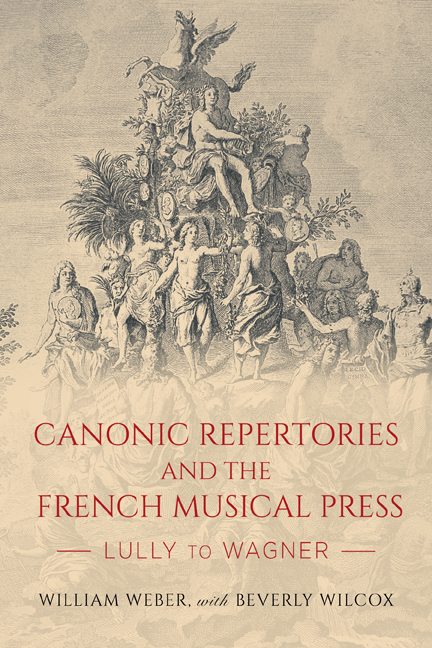Book contents
- Frontmatter
- Contents
- Acknowledgments
- List of Illustrations
- Introduction
- 1 The Domestic versus the Foreign in Eighteenth-Century Paris and London
- 2 Elements of Canon Formation at the Concert Spirituel (Beverly Wilcox)
- 3 To Praise or to Criticize? The Evolution of Music Criticism in Eighteenth-Century France
- 4 Haydn in the Press during the 1780s: How Did a Canon Arise?
- 5 Parallel Canons at the Opéra and the Comédie-Française at the End of the Ancien Régime
- 6 Negotiating Canonic Repertory and les progrès de la musique at the Paris Opéra, 1815–1830
- 7 The Evolution of le vieux répertoire at the Opéra-Comique in the Nineteenth Century
- 8 Richard Wagner, Concert Life, and Musical Canon in Paris, 1860–1914
- An Afterword
- Bibliography
- Index
7 - The Evolution of le vieux répertoire at the Opéra-Comique in the Nineteenth Century
Published online by Cambridge University Press: 26 May 2022
- Frontmatter
- Contents
- Acknowledgments
- List of Illustrations
- Introduction
- 1 The Domestic versus the Foreign in Eighteenth-Century Paris and London
- 2 Elements of Canon Formation at the Concert Spirituel (Beverly Wilcox)
- 3 To Praise or to Criticize? The Evolution of Music Criticism in Eighteenth-Century France
- 4 Haydn in the Press during the 1780s: How Did a Canon Arise?
- 5 Parallel Canons at the Opéra and the Comédie-Française at the End of the Ancien Régime
- 6 Negotiating Canonic Repertory and les progrès de la musique at the Paris Opéra, 1815–1830
- 7 The Evolution of le vieux répertoire at the Opéra-Comique in the Nineteenth Century
- 8 Richard Wagner, Concert Life, and Musical Canon in Paris, 1860–1914
- An Afterword
- Bibliography
- Index
Summary
The canonic repertory performed at the Opéra-Comique lasted remarkably long, from the 1760s to the 1890s, involving three cohorts of composers. Several works composed by the first cohort in the 1760s were still being performed in the 1890s, particularly pieces by Pierre-Alexandre Monsigny (Le Déserteur, 1769) and André-Ernest Grétry (Richard Coeur-de-Lion, 1784). In addition, several works by Nicolas Dalayrac (Les deux chasseurs et la laitière, 1763) lasted through the 1860s. The second cohort included works by François-Adrien Boieldieu (La Dame blanche, 1825) and Nicolas Isouard (Les Rendez-vous bourgeois, 1807), some of which were still being performed in the 1880s. Operas by the third cohort—Ferdinand Hérold (Zampa ou La fiancée de marbre, 1831), Adophe-Charles Adam (Le Postillion de Lonjumeau, 1836), and Daniel Auber (Le Domino noir, 1837)—remained in repertory in 1890. By comparison, the intensely public nature of the Paris Opéra tended to limit periods of repertory to about fifty years of performances. To be sure, a few operas remained in repertory at the Opéra remarkably long, chiefly Rossini's Guillaume Tell (1828–1936) and Meyerbeer's Les Huguenots (1836–1936). The latter came under serious criticism, and, on the whole, operas given at that theater tended to last no more than fifty years. But the quiet, less controversial atmosphere at the Opéra-Comique allowed more pieces to continue for longer periods of time than at the Opéra. This chapter compares the evolution of old repertories in the two theaters, focusing on developments at several points in time.
The genre of opéra comique grew out of the expansion and transformation of Italian theatrical and musical conventions that occurred at the fair-ground theaters in the middle of the eighteenth century. A shift gradually occurred from setting vaudeville texts linked with traditional timbres (known melodies) to the presentation of songs composed for the genre called comédie mêlée d’ariettes. Originally developed under the aegis of the Comédie-Italienne, the genre obtained its own theater, the Opéra-Comique, in 1762, where performers governed the theater's operations. In 1753 Les Troqueurs (The wife-swappers) became the first work known as opéra comique because it was set to new music, rather than to conventional timbres, with text by Jean-Joseph Vadé and music by Antoine Dauvergne.
- Type
- Chapter
- Information
- Canonic Repertories and the French Musical PressLully to Wagner, pp. 202 - 227Publisher: Boydell & BrewerPrint publication year: 2021



